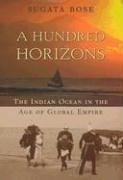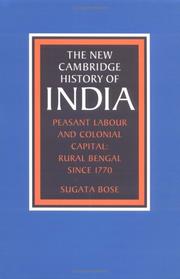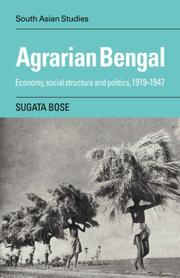| Listing 1 - 10 of 27 | << page >> |
Sort by
|

ISBN: 0674021576 9780674021570 0674032195 0674028570 Year: 2006 Publisher: Cambridge, Mass. Harvard University Press
Abstract | Keywords | Export | Availability | Bookmark
 Loading...
Loading...Choose an application
- Reference Manager
- EndNote
- RefWorks (Direct export to RefWorks)
World history --- Indian Ocean --- Indian Ocean Region --- History. --- Indian Ocean Rim countries --- History --- Indian Ocean Region -- History. --- HISTORY / Asia / India & South Asia. --- Annals --- Auxiliary sciences of history

ISBN: 0521266947 Year: 1993 Volume: 2 Publisher: Cambridge Cambridge University Press
Abstract | Keywords | Export | Availability | Bookmark
 Loading...
Loading...Choose an application
- Reference Manager
- EndNote
- RefWorks (Direct export to RefWorks)
Industries --- Peasants --- Industrie --- Paysannerie --- History --- Histoire --- Bengal (India) --- Bengale (Inde) --- Colonization --- Rural conditions --- Colonisation --- Conditions rurales --- -Peasantry --- Agricultural laborers --- Rural population --- Marks (Medieval land tenure) --- Villeinage --- Industrial production --- Industry --- Economics --- -Bengal (India) --- -Colonization --- -History --- History. --- Peasantry --- Bengal --- Fort William (India) --- Presidency of Fort William (India) --- Bengale (India) --- Baṅgāla (India) --- Eastern Bengal and Assam (India) --- West Bengal (India) --- East Bengal (Pakistan) --- Rural conditions. --- Industries, Primitive
Book
ISBN: 0674060830 9780674060838 9780674047549 0674047540 0674262247 0674065964 Year: 2011 Publisher: Cambridge, MA
Abstract | Keywords | Export | Availability | Bookmark
 Loading...
Loading...Choose an application
- Reference Manager
- EndNote
- RefWorks (Direct export to RefWorks)
The man whom Indian nationalists perceived as the "George Washington of India" and who was President of the Indian National Congress in 1938-1939 is a legendary figure. Called Netaji ("leader") by his countrymen, Subhas Chandra Bose struggled all his life to liberate his people from British rule and, in pursuit of that goal, raised and led the Indian National Army against Allied Forces during World War II. His patriotism, as Gandhi asserted, was second to none, but his actions aroused controversy in India and condemnation in the West. Now, in a definitive biography of the revered Indian nationalist, Sugata Bose deftly explores a charismatic personality whose public and private life encapsulated the contradictions of world history in the first half of the twentieth century. He brilliantly evokes Netaji's formation in the intellectual milieu of Calcutta and Cambridge, probes his thoughts and relations during years of exile, and analyzes his ascent to the peak of nationalist politics. Amidst riveting accounts of imprisonment and travels, we glimpse the profundity of his struggle: to unite Hindu and Muslim, men and women, and diverse linguistic groups within a single independent Indian nation. Finally, an authoritative account of his untimely death in a plane crash will put to rest rumors about the fate of this "deathless hero." This epic of a life larger than its legend is both intimate, based on family archives, and global in significance. His Majesty's Opponent establishes Bose among the giants of Indian and world history.
Nationalists --- Statesmen --- Bose, Subhas Chandra, --- Subhas Chandra Bose, --- Vasu, Subhasa-chandra, --- Basu, Subhāshacandra, --- Subhāshacandra Basu, --- Subhasa-chandra Vasu, --- Netaji Subhas Chandra Bose, --- Bōsu, Subāsu Chandora, --- Bosa, Subhāsha Candra, --- Subhāsha Candra Bosa, --- Cupāṣ Cantirapōs, --- Cantirapōs, Cupāṣ, --- Nēttāji, --- Sūpāṣ Cantra Vasū, --- Vasū, Sūpāṣ Cantra, --- Bos, S. Ch., --- Bose, Chandra, --- Suphāt Čhanthra Bōt, --- Bōt, Suphāt Čhanthra, --- Bōs, Subhāṣcandra, --- Subhāṣcandra Bōs, --- Candrabōs, Subhāṣ, --- Bōs, Subhāṣ Candra, --- Bos, Subhash Chandra, --- Bojha, Subhāshacandra, --- Bose, Subhashchandra,d1897-1945 --- India --- Politics and government --- Bose, Subhashchandra, --- Bos, Subkhas Chandra, --- Бос, Субхас Чандра, --- Netadzhi, --- Нетаджи,

ISBN: 0521053625 0511559828 0521304482 0521059429 Year: 1986 Volume: [36] Publisher: Cambridge : Cambridge University Press,
Abstract | Keywords | Export | Availability | Bookmark
 Loading...
Loading...Choose an application
- Reference Manager
- EndNote
- RefWorks (Direct export to RefWorks)
As well as being an outstanding contribution to Indian economic and social history, this book draws important conclusions about peasant politics in general and about the effects of international economic fluctuations on primary producing countries. Dr Bose develops a general typology of systems of agrarian production in Bengal to show how these responded to different types of pressure from the world economy, and treats in detail the effects of the world Depression on Bengal. Separate chapters are devoted to the themes of agrarian conflict and religious strife in east Bengal, the agrarian dimension of mass nationalism in west Bengal and sharecroppers agitations in the frontier regions. The conclusion attempts a synthesis of the typology of agrarian social structure and the periodisation of peasant politics, placing this in the wider context of agrarian societies and protest in other parts of India and in South-east Asia.
Peasants --- Peasantry --- Agricultural laborers --- Rural population --- Marks (Medieval land tenure) --- Villeinage --- History. --- Political activity --- Bengal (India) --- Social conditions. --- Business, Economy and Management --- Economics
Book
ISBN: 9781139055680 9780521266949 9780521056137 Year: 1993 Publisher: Cambridge Cambridge University Press
Abstract | Keywords | Export | Availability | Bookmark
 Loading...
Loading...Choose an application
- Reference Manager
- EndNote
- RefWorks (Direct export to RefWorks)
Book
ISBN: 0195625447 Year: 1990 Publisher: Delhi Bombay Calcutta Oxford University Press
Abstract | Keywords | Export | Availability | Bookmark
 Loading...
Loading...Choose an application
- Reference Manager
- EndNote
- RefWorks (Direct export to RefWorks)
Book
ISBN: 0195633083 Year: 1994 Publisher: Delhi New York Oxford University Press
Abstract | Keywords | Export | Availability | Bookmark
 Loading...
Loading...Choose an application
- Reference Manager
- EndNote
- RefWorks (Direct export to RefWorks)

ISBN: 9780674028579 0674028570 0674021576 9780674021570 0674021576 9780674021570 9780674032194 0674032195 Year: 2009 Publisher: Cambridge, MA
Abstract | Keywords | Export | Availability | Bookmark
 Loading...
Loading...Choose an application
- Reference Manager
- EndNote
- RefWorks (Direct export to RefWorks)
Book
ISBN: 0521056136 1139055682 Year: 1993 Publisher: Cambridge : Cambridge University Press,
Abstract | Keywords | Export | Availability | Bookmark
 Loading...
Loading...Choose an application
- Reference Manager
- EndNote
- RefWorks (Direct export to RefWorks)
This book is a critical work of synthesis and interpretation on one of the central themes in modern Indian history - agrarian change under British colonial rule. Sugata Bose analyses the relationships between demography, commercialization, class structure and peasant resistance unfolding over the long term between 1770 and more recent times. By integrating the histories of land and capital, he examines the relationship between capitalist 'development' of the wider economy under colonial rule and agrarian continuity and change. Drawing most of his empirical evidence from rural Bengal, the author makes comparisons with regional agrarian histories of other parts of South Asia. Thus, this study stands on its own in the field of modern Indian social and economic history in its chronological sweep and comparative context and makes the complex subject of India's peasantry accessible to students and the interested non-specialist.
Peasants --- Industries --- History. --- Bengal (India) --- Colonization --- Rural conditions.
Digital
ISBN: 9780674028562 Year: 2009 Publisher: Cambridge, Mass. Harvard University Press
Abstract | Keywords | Export | Availability | Bookmark
 Loading...
Loading...Choose an application
- Reference Manager
- EndNote
- RefWorks (Direct export to RefWorks)
| Listing 1 - 10 of 27 | << page >> |
Sort by
|

 Search
Search Feedback
Feedback About UniCat
About UniCat  Help
Help News
News